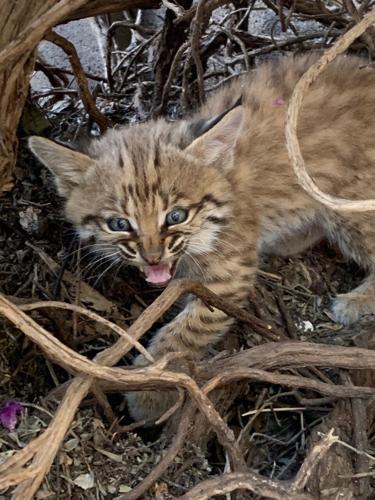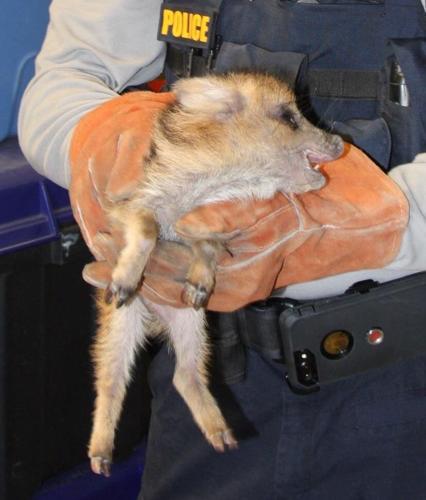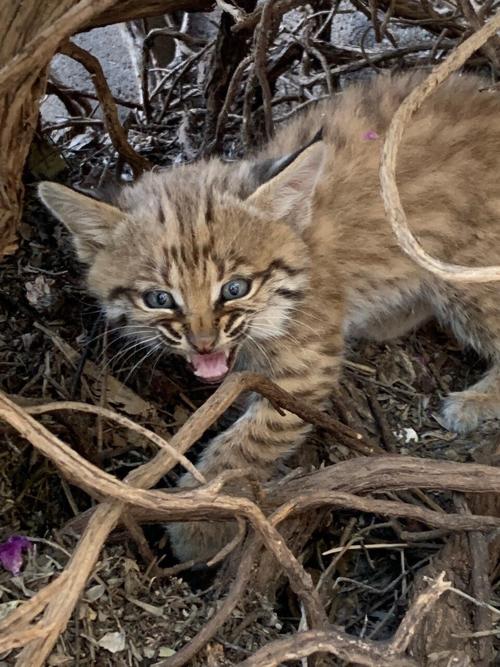After a young javelina and bobcat were separated from their mothers, the Arizona Game and Fish Department and the Tucson Wildlife Center are asking the public to leave baby wildlife alone.
Officials have taken custody of the animals after they were unintentionally separated from their mothers by people who thought they were abandoned, according to a news release from the AZGFD.

A young javelina was separated from its mother after someone mistakenly thought the animal had been abandoned.
Increased calls to the AZGFD’s office suggest the “rescues” may soon become a trend involving other species like deer fawns and baby tortoises, the news release said. Taking captive and holding young wildlife is illegal. Maximum penalties for the violations are four months in jail and a $750 fine.
Arizona Game and Fish said that in most instances, baby mammals should be left in place and untouched, unless they are obviously injured. Although they may appear orphaned, baby mammals are typically left alone while the mother forages for food and water.
If a baby mammal is immobile and at immediate risk of injury, they can be moved to a safe location nearby that provides appropriate cover, the news release said. The mother will likely find the relocated baby by smell or hearing and continue to provide care.
Separating a baby mammal from its mother may result in euthanizing the animal unless a zoo or shelter can take it, the news release said. Chronic Wasting Disease in deer further complicates the issue, as the fawn is suspect since Game and Fish cannot verify that the animal is not from a state where the disease occurs.
“In the majority of cases, it is best to leave all baby wildlife alone. People’s desire to help seemingly abandoned animals can have unintended negative consequences,” said Regional Supervisor Raul Vega of Game and Fish in Tucson in the news release. “Although it seems humane to ’help’ or ’rescue’ baby animals perceived to be in need, wildlife reared in captivity by humans — without the benefit of learning from their parents — have a greatly reduced chance of survival if they are released back into the wild.”
Photos: Suburban bobcat sightings around Tucson
Suburban bobcat sightings
Updated
The babies were fooling around with the desert tortoise but luckily soon lost interest. He was fine.
Suburban bobcat sightings
Updated
David Burford snapped some photos of a mama bobcat and her three kittens in the backyard of his Oro Valley home.
Suburban bobcat sightings
Updated
Victor Sunstar spotted bobcats in his yard almost every morning.
Watch Now: Collared bobcat raises kittens in Tucson neighborhood
UpdatedResearchers and residents get a look at how an urban bobcat raises her young.
Suburban bobcat sightings
Updated
This bobcat watched as Sherri Brean took its photo March 3, 2022, at a house near Oro Valley.
Suburban bobcat sightings
Updated
On March 3, 2022, Arizona Daily Star reporter Henry Brean caught the same bobcat taking a nap.
Bobcat plays with its kitten in Tucson backyard
UpdatedTucson wildlife: A bobcat and its baby were caught on camera multiple times playing together in a backyard on Tucson's southeast side this weekend. These desert cats were seen on June 11 and 12, between 5 and 6 a.m., by Tucson resident Tracie Robbins, who shared the videos on Twitter.
"We may not see a bobcat for months, and then sometimes we’ll have visitors for several days in a row," Robbins said. She said she noticed a basket of golf balls tipped over when she woke up and took that as a sign that the cats routinely stop by to visit and play on the putting green outside. Video courtesy of Tracie Robbins.
Suburban bobcat sightings
Updated
Bobcat kitten on the wall
Suburban bobcat sightings
Updated
Bobcat found a warm, dry place to nap on our patio during the rain.
Watch now: Bobcat's breakfast near Oro Valley
UpdatedWatch as this bobcat stalks his prey and then catches it. Let this remind you not to leave small pets outside unattended. Video by Sandra McCauley.
Suburban bobcat sightings
Updated
Bobcat moments before his kill of a ground squirrel
Suburban bobcat sightings
Updated
Bobcat kittens in a tree
Watch now: Family of bobcats spotted in Foothills back yard
UpdatedThree bobcats were filmed Jan. 2 passing through the back yard of a home in the Catalina Foothills just before sunset.
Jennifer Perez, who recorded the video of the feline trio and shared it on social media, said she often sees wildlife enter her yard from a deep wash located behind it. One bobcat shown can be heard softly growling around 30 seconds into the video. Video courtesy of Jennifer Perez.
Suburban bobcat sightings
Updated
Young Bobcats drinking. Mom is nearby.
Suburban bobcat sightings
Updated
This bobcat was spotted drinking out of our fountain
Suburban bobcat sightings
Updated
Taken in Oro Valley
Watch now: A conversation between bobcats in the Tucson area
UpdatedJennifer Perez calls the female bobcat Sheba and the male Zeus. Zeus made his way over to have a drink of fresh water and Sheba went over behind him. When both of them were at the dish Zeus showed his dominance and Sheba became submissive. Video by Jennifer Perez.
Suburban bobcat sightings
Updated
A courageous bobcat atop a Saguaro.
Suburban bobcat sightings
Updated
Mike Klinicki took this photo at his home on June 2015. "We discovered bobcats living on our roof after hearing some noise several nights in a row. We live in Vail. There was a mother and three cubs."
Suburban bobcat sightings
Updated
We have had lots of bobcat visitors around here. My favorite is when there is a mama with her babies.
Watch now: Bobcat vs. snake in Tucson yard
UpdatedA bobcat kitten found a snake in the backyard of a Tucson home and couldn't resist a tussle. The bobcat was born several months prior near the home. Video by Eric Schaffer.
Suburban bobcat sightings
Updated
Jim Liessmann took this picture on April 30, 2008, of a bobcat on a saguaro.
Suburban bobcat sightings
Updated
Gay Russell took this photo in June 2011. "After several days of resting and playing in my yard, a mother bobcat left her two kittens, about a month old, with me while she went hunting. I was able to catch this photo of one of the kittens, playing peek-a-boo! "
Watch now: Bobcat stops by Tucson waterhole for an overnight drink
UpdatedThis thirsty bobcat was filmed drinking from a well in a Catalina Foothills resident's back yard Saturday, July 9. "Fred" the bobcat is a regular visitor to this waterhole. Video courtesy of Yessica Wheeler.
Suburban bobcat sightings
Updated
"Fred" the bobcat sits in front of cactus in a Catalina Foothills resident's back yard.






